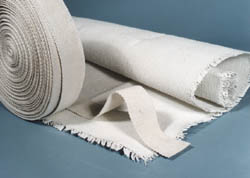REFRACTORY SHEET TYPES RS- CLOTH &
RS-TAPE
 ZRCI Refractory Sheet Types RS-Cloth and
RS-Tape are fiber reinforced alumina
composites in a highly flexible form. They are received dried, when wet with
water or AL-HARD Hardener they become extremely
flexible. They can be wrapped into many simple or complex shapes and will stick
to themselves. When dried they become an extremely hard, strong, self supporting
composite structures. RS-Putty can be used to burnish any surface and provide a
very smooth hard finish. After a low temperature bake-out of 300캜 (570캟)
RS-Cloth and RS-Tape are unaffected by moisture.
They offer the strength, durability, flexibility and
versatility required by many high temperature applications up to 1300캜 (2373캟).
Their high alumina content makes Refractory Sheet RS-Cloth and RS-Tape highly
resistant to many environments including Hot Glass handling, molten aluminum and
chemical and petroleum processing. After they are baked out they are not
affected by water as well as many types of fuel oils.
When hardened with
AL-HARD Refractory Sheet RS-Cloth and RS-Tape
become "rock hard" for greater strength
|
|
SUGGESTED APPLICATIONS
High temperature,
high strength
gasketing
Replacement for asbestos textiles in induction
glass melting furnaces
High temperature pipe wrapping
Induction heating furnace coil liners &
insulators
Electrical insulation for band and strip
heaters
Non-ferrous metal transport
Flame and splash curtains
Hot glass handling
Reinforcement of composite structures
Immersion pyrometer protection tubes
Small appliance electrical insulation
Wire and cable insulation
Pipe wrap and protection
.
|
CHARACTERISTICS &
PROPERTIES
|
Color |
White |
|
Composition, % |
|
|
Al2O3 |
65 |
|
SiO2 |
21 |
|
Other Oxides |
14 |
|
Organic Content |
<1 |
|
Bulk Density, gm/cm3 (pcf) |
1.5 (92) |
|
Flammability |
Nil |
|
Maximum Service Temp *, C (F) |
1300 (2373) |
|
Melting Point, C (F) |
1500 (2732) |
|
Tensile Strength, MPa (psi) |
2.93 (425) |
|
Linear Shrinkage, % |
|
|
24 hrs@1100캜, (2012캟) |
2 |
|
Thermal Conductivity, Estimated, |
|
|
W/m ?/sup>K (Btu/hr?/sup>F
ft2/in.) |
|
|
800캜 (1472캟) |
0.6
(4) |
*Maximum Use Temperature is dependant on
variables such as the stresses, both thermal and mechanical, and the environment
that the insulation experiences.
|

